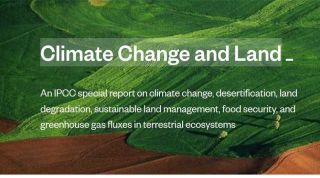Does Ireland need a sustainable land use strategy?

The latest IPCC Report makes the case for better land management as one of the solutions to tackling climate change in conjunction with emissions reductions from all sectors. The report is clear that without significant and sustained reductions in greenhouse gas emissions from all sectors immediately, then global warming will not be kept below the Paris Agreement target that Ireland is a signatory to. The report concludes that that an overall focus on sustainability will deliver the best outcomes in terms of tackling climate change.
Some of the issues raised in the report are:
- Land must remain productive to maintain food security
- Bioenergy and use of land for biofuels must be very carefully managed to avoid risks to food security, biodiversity and land degradation
- Sustainable land management is vital to protect poorest communities from detrimental impact of soil erosion
- The most drastic impact of climate change on food security (including access to and affordability of food) will be seen in low income countries in Africa, Asia, Latin America and the Caribbean.
- One third of food that is currently produced is lost or wasted
- Plant based foods such as coarse grains, legumes, fruits and vegetables present opportunities for adaptation and limiting climate change
- Early action is most cost effective as it avoids losses
The findings of the report provide us with considerable food for thought. What kind of land management and farming do we want in Ireland? If we really want to support small farmers, local communities and short supply chains what policies do we need to implement to do this?
This report must be taken into consideration as part of the ongoing public consultation on Ireland’s Agri-Foods Strategy to 2030 which will replace FoodWise 2025 and should inform the direction of this report.
In order to lead in climate smart agriculture Ireland needs to reduce absolute emissions from agriculture. This will require a step change in agricultural policy, and an end to incoherence of pursuing strategies that lead to an annual increase in agricultural emissions whilst simultaneously setting emissions reductions targets. Ireland should focus on developing alternative agricultural models and move away from extensive livestock farming.
Support for sustainable agricultural practice is important to ensure the long-term viability of the sector. In terms of our national and international climate commitments it must be asked what agricultural policy will be best-placed to ensure Ireland meets its national and international targets: Is it a policy of agricultural expansion and increased emissions to reach additional markets or is it a policy of ensuring Ireland produces the food required to meet our population needs and supports the agricultural sector in the developing world to ensure they can provide the food required to meet their own population needs?